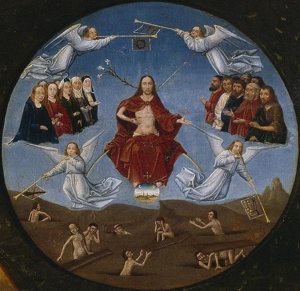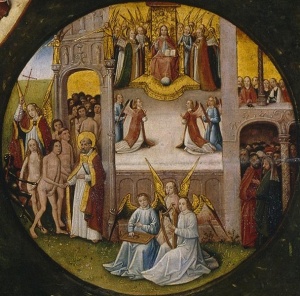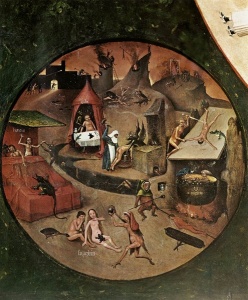What is the Catholic view on death and the afterlife ?
You are here: » Christianity in View » Introduction to Roman Catholicism » Last Things
 Page Navigation:
Page Navigation:
Death | Heaven | Hell | Purgatory
 The Four Last Things
The Four Last Things
In Catholic tradition, reference is often made to the Four last things viz. Death, Judgement, Heaven and Hell. St. Philip Neri remarked that “Beginners in religion ought to exercise themselves principally in meditation on the Four Last Things.”
 Death
Death
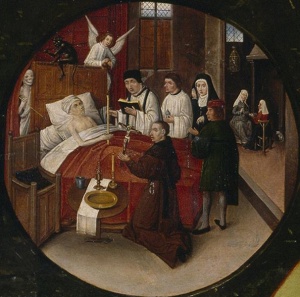
Catholicism distinguishes between two kinds of judgements at death. The first is the Particular judgement, determining the fate of the soul at death, and secondly, the General judgement, which will occur when Christ returns and is upon mankind as a whole.
“Death is the end of man’s earthly pilgrimage, of the time of grace and mercy which God offers him so as to work out his earthly life in keeping with the divine plan, and to decide his ultimate destiny. When the single course of our earthly life is completed, we shall not return to other earthly lives: ‘It is appointed for men to die once.’ There is no ‘reincarnation’ after death. The Church encourages us to prepare ourselves for the hour of our death…”
Paragraphs 1013-4, CCC.
 Heaven
Heaven
“Those who die in God’s grace and friendship and are perfectly purified live for ever with Christ. They are like God for ever, for they see him as he is, face to face… This perfect life with the Most Holy Trinity – this communion of life and love with the Trinity, with the Virgin Mary, the angels and all the blessed – is called Heaven. Heaven is the ultimate end and fulfilment of the deepest human longings, the state of supreme, definitive happiness.”
Paragraphs 1023-4, CCC.
Entrance into Heaven may be direct or via Purgatory (see below). In either case, one must be free of all sin to qualify. Those who see God face to face are said to have received the ‘Beatific Vision’.
 Hell
Hell
“We cannot be united with God unless we freely choose to love him. But we cannot love God if we sin gravely against him, against our neighbour or against ourselves: “He who does not love remains in death. Anyone who hates his brother is a murderer, and you know that no murderer has eternal life abiding in him. Our Lord warns us that we shall be separated from him if we fail to meet the serious needs of the poor and the little ones who are his brethren. To die in mortal sin without repenting and accepting God’s merciful love means remaining separated from him for ever by our own free choice. This state of definitive self-exclusion from communion with God and the blessed is called Hell.”
Paragraph 1033, CCC.
The Catholic view is that, on death those souls who die with unremitted mortal sin enter directly into hell. There is no cross-over between heaven and hell, nor is there any predestination to hell. Hell is seen as a place chosen by those who knowingly and willfully turn away from God.
 Purgatory
Purgatory
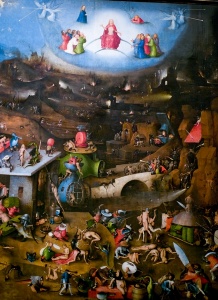
Catholic theology regards Purgatory as a state of cleansing and preparation for heaven. Only those with unremitted venial sins may enter Purgatory. Unconfessed or unrepented mortal sin is considered damnable.
“Every man’s work shall be manifest. For the day of the Lord shall declare it, because it shall be revealed in fire. And the fire shall try every man’s work, of what sort it is. If any man’s work abide, which he hath built thereupon, he shall receive a reward. If any mans work burn, he shall suffer loss: but he himself shall be saved, yet so as by fire.”
1 Corinthians 3:13-15 (DRB).
The verse above talks of ‘fire’ and this is taken to refer to the purifying fires of Purgatory which unite the will of the soul to that of God. It is thought that the duration spent there is proportional to the degree of sin committed.
“All who die in God’s grace and friendship, but still imperfectly purified, are indeed assured of their eternal salvation; but after death they undergo purification, so as to achieve the holiness necessary to enter the joy of heaven. The Church gives the name Purgatory to this final purification of the elect, which is entirely different from the punishment of the damned. The Church formulated her doctrine of faith on Purgatory especially at the Councils of Florence and Trent. The tradition of the Church, by reference to certain texts of Scripture, speaks of a cleansing fire…”
Paragraphs 1030-1, CCC.
The church believes that the terms of those in Purgatory (known as the ‘Holy Souls’) may be shortened in two ways:
- By praying for them (including saying the Rosary) and thus obtaining an Indulgence*. Also, on 2 November, the church sets aside a special day (‘All Souls Day’) to remember those who have died and are now in Purgatory.
- By offering a Mass on their behalf (Recall the fact that the Mass is seen as a sacrifice for sin, effective not only for the living, but also for the dead).
* We discuss Indulgences in the section ‘Moral Issues’.
Prayers for the dead are commended in one of the Apocryphal (Deuterocanonical) books (2 Maccabees):
“It is therefore a holy and wholesome thought to pray for the dead, that they may be loosed from sins.”
2 Maccabees 12:46 (DRB).
The Italian writer Dante Alighieri (1265-1321) wrote poetically of Purgatory. In the Divine Comedy, Dante describes his journey through the three states of Hell, Purgatory and Paradise. In Purgatory there are seven terraces, corresponding to the seven deadly sins:
- Lust
- Gluttony
- Avarice (Greed)
- Sloth (Laziness)
- Wrath
- Envy
- Pride
Purgatory should be distinguished from Limbo, an intermediate state posited for those (especially children and newborn infants) who die while unbaptised and in a ‘state of grace’. The church has not as yet made any official statements on the existence of Limbo, but many incline toward rejecting it.
There is also a “Limbo of the Fathers”, which is also known as “Abraham’s Bosom”, denoting a place where the righteous who died before Christ came to earth dwelled while awaiting their final destiny in heaven (See Luke 16:19-31).
Thomas Aquinas described the limbo of children as an “eternal state of natural joy” in which unbaptised children were unaware of the greater joy of Heaven. However, the Catechism states that: “As regards children who have died without Baptism, the Church can only entrust them to the mercy of God….” (Paragraph 1261).
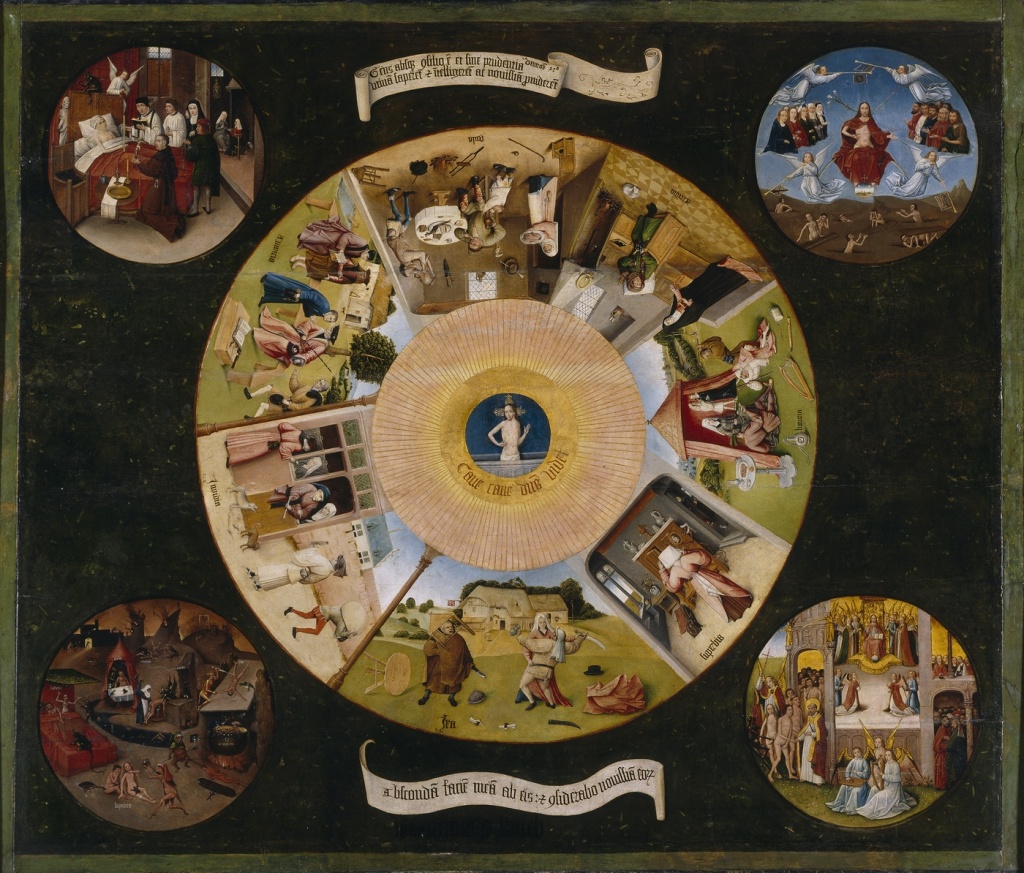
The Seven Deadly Sins and Four Last Things by Hieronymus Bosch.
 More information:
More information:
Here is a selected series of links that will give more information:
Catholic Catechism – Hell | Catholic Encyclopedia – Purgatory | Wikipedia – Heaven |
 Wise words:
Wise words:
“O death, where is thy victory? O death, where is thy sting?”
(1 Corinthians 15:55 – DRB)
